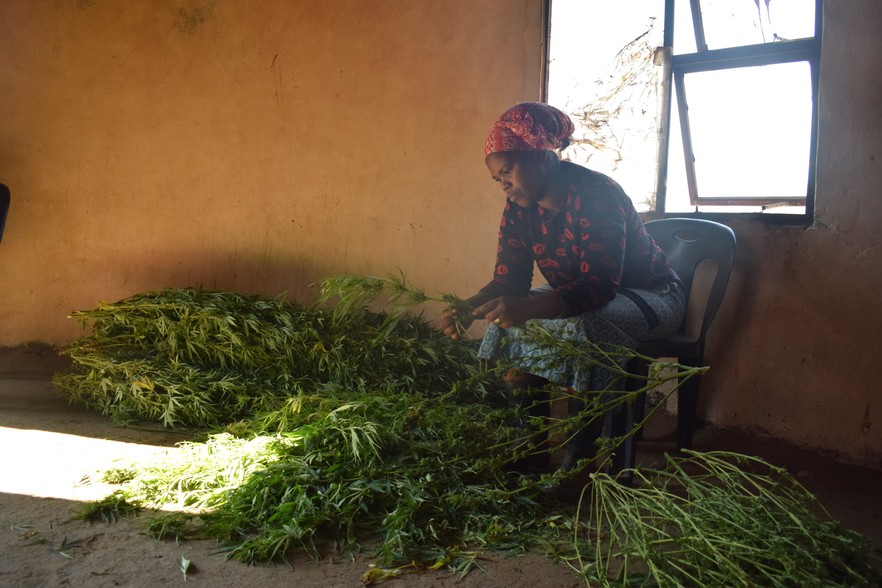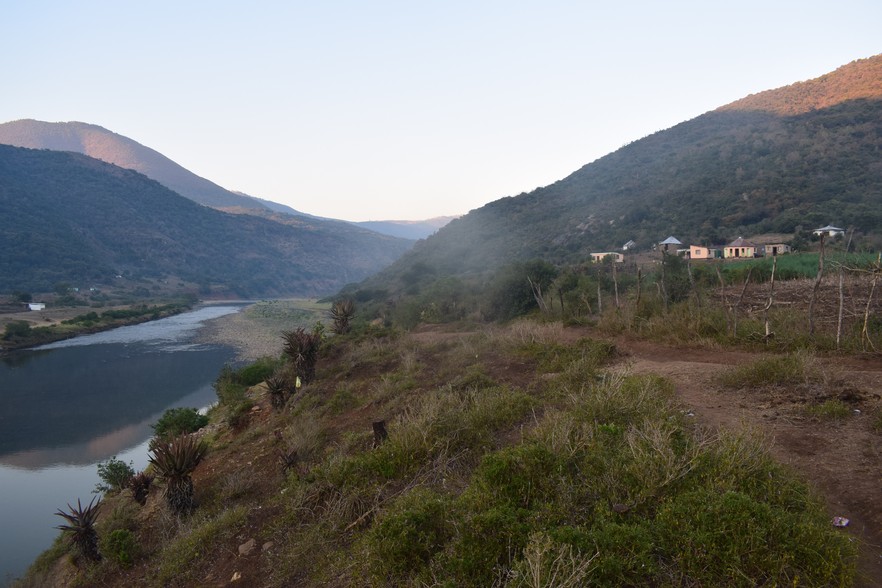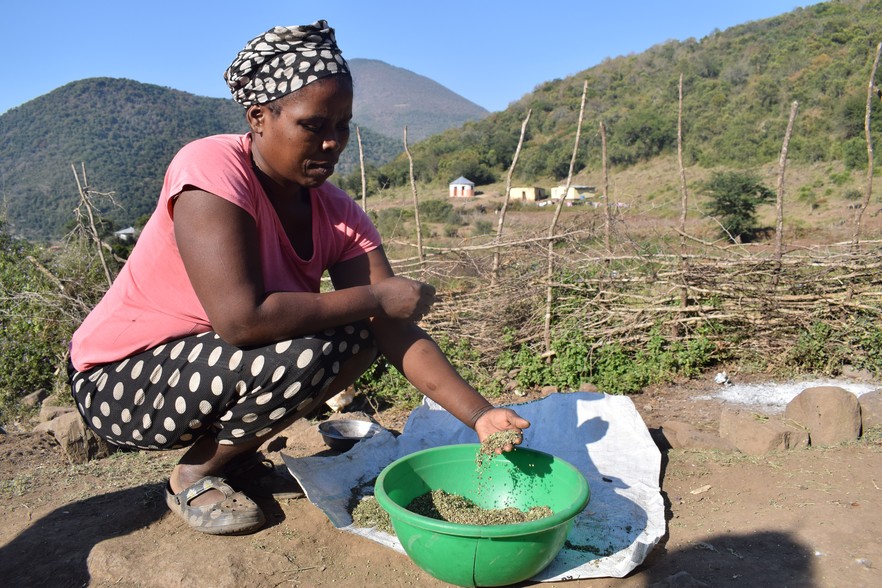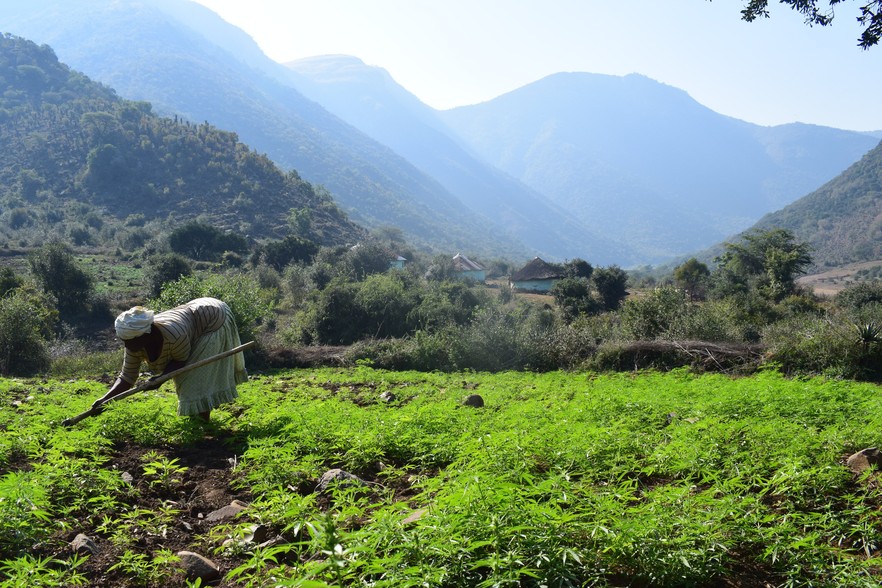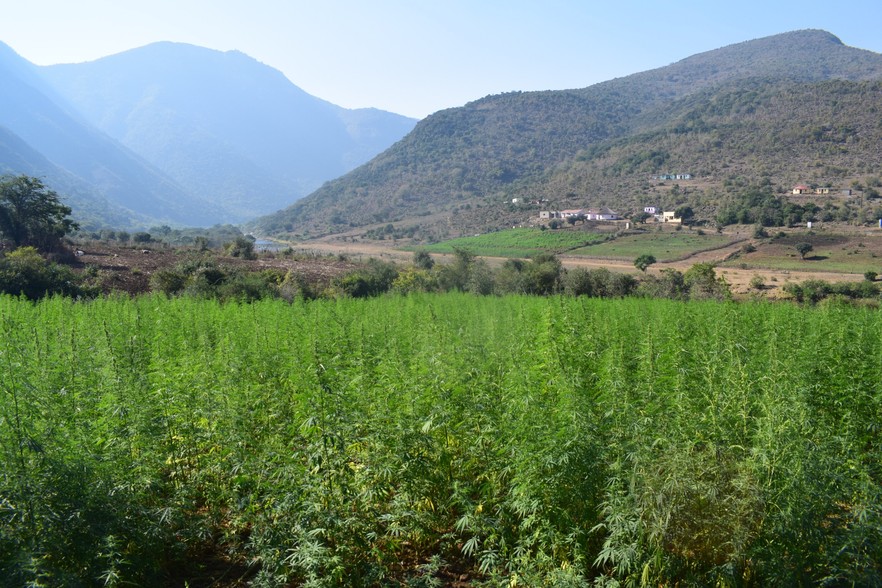Mpondoland dagga growers left out to dry
Six years after the Constitutional Court judgment, small-scale dagga growers are sliding deeper into poverty while businesses profit in South Africa’s “cowboy” cannabis industry
Nonkanyiso Bhulabhula trims freshly harvested dagga with her hands. She and her husband, Lungisani Khumbafathi, rely on cultivating the crop for survival. Photos: Lucas Nowicki
The police could never shut down the trade of dagga from Mpondoland. But the gradual decriminalisation of cannabis, ironically, has posed a bigger existential threat to these small farmers than law enforcement did. While anti-cannabis laws were enforced, there was a ready market for dagga grown in remote Eastern Cape villages. But with the flourishing of the often illicit, but largely unpoliced, cannabis trade in cities in recent years, it has become extremely difficult for these farmers to compete with much more sophisticated operations on quality or price.
It is a dry winter morning in Dikidikini, a remote village in the Mpondoland region of the Eastern Cape. The sun is still behind the steep rocky mountains towering over the village as 60-year-old Landiwe Msolongile gazes over her recently planted dagga field along the Mzintlava River.
“There was a time when we were making good money,” Msolongile told GroundUp as she surveyed her field full of small spindly dagga plants. “My grandfather sent us to school with money from growing dagga. Our parents even bought us cattle and clothes from growing … Everything has changed now.”
Farmers have grown cannabis in the valleys of Eastern Mpondoland in villages like Dikidikini for over 100 years. Mountains tower over the village, obscuring the cannabis fields from the prying eyes of authorities.
But this once valuable illicit cash-crop now yields barely enough for farmers to buy basic groceries to get their family through the month.
Growers in the area described to GroundUp how changes since the 2018 Constitutional Court judgment – which decriminalised growing cannabis for private use – have affected Mpondo small-scale growers.
“The prices went down rapidly,” says Lungisani Khumbafathi, who farms cannabis with his wife, Nonkanyiso Bhulabhula, in Dikidikini. “I used to make R2,000 or R1,500 for a bucket [20 litres] but now it’s only R500,” Khumbafathi told GroundUp while trimming the leaves off freshly harvested cannabis.
Initially growers like Khumbafathi tried to compensate for the drop in prices by growing larger quantities of cannabis. “Because of the low pricing, we had to clear more land and grow more dagga. I had to make sure I sell at least four buckets (20 litres) in order to buy groceries and other basic necessities like clothes for my children,” said Khumbafathi, who, like most people in the area, does not smoke the plant known locally as Ntsangu.
But this created an oversupply of cannabis from the area. With a dwindling customer base, Khumbafathi says they have had to burn part of their harvest that they could not sell.
The only way to reach Dikidikini is by crossing the Mzintlava river. In summer, when rain raises the river levels, young men transport the elderly across the river in a large 200 litre plastic drum - with no air holes. Most of the village relies on cultivating dagga for subsistence, though very few smoke it.
The drop in prices has been compounded by a drought in the region. “This drought has been persistent for several years. We keep trying to plant but have no harvest. Sometimes the rain fools us and we think it has returned,” said Msolongile.
Msolongile told GroundUp that with the drought, it is very difficult to plant crops other than cannabis. “All the plants I have tried to grow die because there’s no water. I tried to plant maize, beans and squashes here at home. They all died because they were dry.”
Many growers, including Khumbafathi and Msolongile, have come to rely on social grants to pay for food and other basic items.
The destruction of Mpondoland’s illicit cannabis markets
Tijmen Grooten is a Dutch researcher and author of a recent report which looks at the challenges of including small-scale growers, like those from Mpondoland, in the legalisation process.
Grooten identifies three factors that have caused the dramatic decline in the Mpondo growers’ illicit market. The first stems from the 2018 Constitutional Court judgment, which prompted a massive increase in private personal cultivation, denting the Mpondo growers’ illicit market significantly.
The second is the impact of increasingly potent foreign strains on South Africa’s cannabis market. “Historically the success of the Mpondoland cannabis market has been dependent on the absence of a broad variety of cannabis strains in the Southern African sphere,” Grooten told GroundUp.
In Mpondoland, cannabis farmers predominantly grow a landrace cannabis strain. Landrace cannabis strains are native to a specific area, adapting to local climates over time and offering resistance to local pests - making this an easier plant to grow without resources. Although these cannabis plants are valued for their unique genetic traits and cannabinoid profiles, they generally have low levels of Tetrahydrocannabinol (THC), the cannabinoid in the plant that gets you high, and lots of seeds. These are traits which have become increasingly undesirable for the (still illicit) recreational adult use market.
The type of cannabis grown by the farmers in Mpondoland has anywhere between 2.5-8% THC according to Grooten’s study, compared to more popular strains on the market, often grown overseas, which have around 20-28% THC.
The final factor undermining the Mpondo growers’ market has been the proliferation of what Grooten refers to as the “cowboy” cannabis sector in South Africa; where companies who confuse authorities with “pseudo-scientific medicinal models” and legal ambiguities have flooded the cannabis market with potent cannabis strains, often ending up in the “dispensaries” popping up on every street corner.
Last year GroundUp reported on how cannabis “dispensaries” are abusing the Medicines Act to sell cannabis. These unregulated cannabis outlets have become one of the main proliferators of the oversupply of cannabis on the illicit market, according to sources in the industry. The dagga sold at these “dispensaries” is at prices and standards that Mpondo growers cannot compete with, says Grooten.
Big job promises. But will there be delivery?
In 2022, in the annual state of the nation address, President Cyril Ramaphosa highlighted the potential for economic growth and job creation of the cannabis and hemp industry. As early as 2019, Eastern Cape Premier Oscar Mabayane said the cannabis and hemp sectors offered the province significant potential for job creation and poverty alleviation.
The provincial government, under the Eastern Cape Rural Development Agency (ECRDA), has initiated two “incubator” cannabis projects. The first will be in the Magwa Tea Estate, between Lusikisiki and the coast, and the second in Stutterheim, in the western part of the province. It hopes to provide jobs for over 50,000 dagga farmers in the next 12 years.
On its website, the ECRDA says it is “intent on formalising the informal cannabis market in the Wild Coast belt” which would allow for previously illicit markets and growers to be “monitored, regulated and taxed”. However, these projects are yet to gain real momentum.
ECRDA did not respond to repeated requests to provide us with timelines.
Sihle Mkhonjwa sifts through her collection of dagga seeds, preparing to plant for the incoming winter months.
Many of the obstacles to creating an inclusive cannabis industry stem from the government’s approach to legislation and regulation after the 2018 Constitutional Court ruling, Grooten told GroundUp. He said the South African government had adopted parts of Canada’s legislation framework, forgetting that “South Africa’s cannabis market and history does not resemble Canada’s.”
“You can already predict that an inclusive industry involving local growers and heritage farmers will not come out of a legalisation model that relies on private investments and markets,” said Grooten.
Cost of entry
Currently the only legal route into the cannabis trade is obtaining a licence from the South African Health Products Regulation Authority (SAHPRA) for the cultivation of medical cannabis. Known as a Section 22C licence, the process of getting one costs tens of millions of rands and the licence does not give you the right to sell to the public.
You can only sell to other holders of the same licence or licensed entities in other countries. You can also sell if SAHPRA approves what is known as a Section 21 application for a prescription of cannabis for a specific named patient, in which case a pharmacy may buy a unit of cannabis from a Section 22C licence holder and dispense it to the patient.
Since 2018, 102 licences have been granted by SAHPRA, according to recent figures presented to Parliament.
On 28 May President Cyril Ramaphosa signed The Cannabis for Private Purposes Bill into law.
Ricky Stone is a cannabis activist and attorney at Cullinan and Associates. He says the Act has a number of shortcomings. But now that it has been passed, cannabis has been removed from the Drugs and Trafficking Act of 1992, which he described as a “monumental” development because it allows for other pieces of law to be amended within the regulatory framework.
Before the Bill was passed through the National Council of Provinces (NCOP) in November last year, Stone says a last-minute provision was added to allow for potential commercialisation, especially for small-scale growers such as those from Mpondoland.
This addition is found in clause 1 (2) of the Act, which states that the offences of cultivating and dealing cannabis outlined in the Act can be exempted “in terms of a permit or licence issued under any other national legislation.”
Landiwe Msolongile tends to her recently planted dagga plants in Dikidikini. She says that drought has severely affected both her harvest, but also her ability to grow food crops.
Stone hopes this will provide an opportunity for other pieces of legislation to be amended to allow Mpondoland farmers to sell their crops.
But whether this will truly help dagga farmers in the area remains to be seen.
Economics has caused more damage than enforcement
Khumbafathi said he would only be interested in trying to get a legal licence if it would help raise his prices. “I don’t even know how much it [applying for a cultivation licence] costs. But I know from doing a driver’s licence that these things are very expensive,” Khumbafathi told GroundUp.
Many years ago, police squads marched down the steep valleys with machetes to chop down cannabis fields. “After this they changed their method and started flying helicopters to spray our fields with chemicals,” remembers Msolongile.
These helicopters, which became part of police attempts to eradicate cannabis in the 1990s, were donated by the US government. They sprayed cannabis fields with a herbicide called glyphosate twice a year. Despite mounting evidence of health risks and environmental damage caused by the chemical, the spraying was only stopped in 2016.
“Although we wanted the spraying to stop, we did not expect the price to go down after… At that time we were making good money,” says Msolongile, who now survives on her pension, with cannabis providing some extra income.
Sitting at the entrance to his homestead next to his son, Khumbafathi pauses in his work of trimming the leaves off a small cannabis plant, thinking about his family’s future. He has five people to feed.
“If the prices continue to decline, I will have to go search for a piece-meal job. I can’t get a skilled job because I don’t have any qualifications. So I would have to move from here to a city to find a job just to support my family,” Khumbafathi told GroundUp.
“I would truly be grateful if the government could support us, not necessarily to cultivate, but to help us sell.”
A tall field of landrace dagga referred to as ‘TK’. Landrace dagga strains are easy to grow, as they have adapted to the local climate.
Support independent journalism
Donate using Payfast

Don't miss out on the latest news
We respect your privacy, and promise we won't spam you.
Next: New shelter for hundreds of homeless people opens in Green Point
Previous: Boksburg school hosts massive international marimba festival
© 2024 GroundUp. This article is licensed under a Creative Commons Attribution-NoDerivatives 4.0 International License.
You may republish this article, so long as you credit the authors and GroundUp, and do not change the text. Please include a link back to the original article.
We put an invisible pixel in the article so that we can count traffic to republishers. All analytics tools are solely on our servers. We do not give our logs to any third party. Logs are deleted after two weeks. We do not use any IP address identifying information except to count regional traffic. We are solely interested in counting hits, not tracking users. If you republish, please do not delete the invisible pixel.

